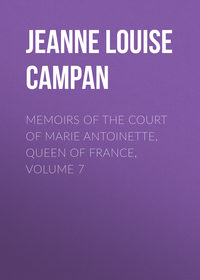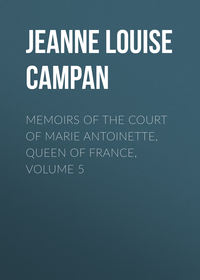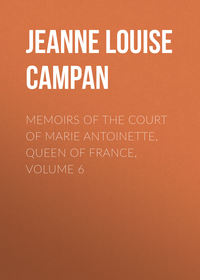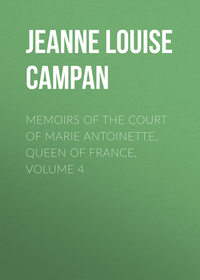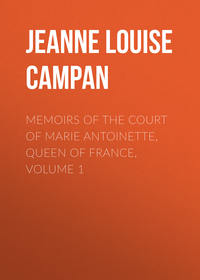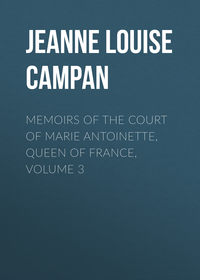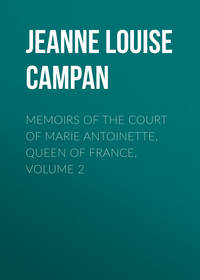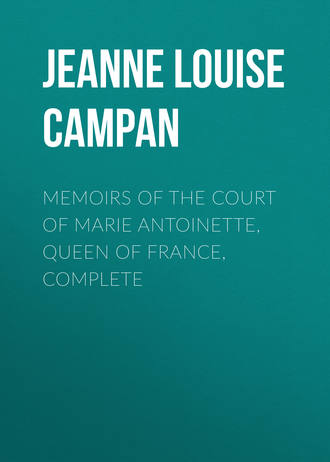 полная версия
полная версияMemoirs of the Court of Marie Antoinette, Queen of France, Complete
“The Dauphin was little known, and his character has been much mistaken. He himself, as he confessed to his intimate friends, sought to disguise it. He one day asked one of his most familiar servants, ‘What do they say in Paris of that great fool of a Dauphin?’ The person interrogated seeming confused, the Dauphin urged him to express himself sincerely, saying, ‘Speak freely; that is positively the idea which I wish people to form of me.’
“As he died of a disease which allows the last moment to be anticipated long beforehand, he wrote much, and transmitted his affections and his prejudices to his son by secret notes.
“Madame de Pompadour’s brother received Letters of Nobility from his Majesty, and was appointed superintendent of the buildings and gardens. He often presented to her Majesty, through the medium of his sister, the rarest flowers, pineapples, and early vegetables from the gardens of Trianon and Choisy. One day, when the Marquise came into the Queen’s apartments, carrying a large basket of flowers, which she held in her two beautiful arms, without gloves, as a mark of respect, the Queen loudly declared her admiration of her beauty; and seemed as if she wished to defend the King’s choice, by praising her various charms in detail, in a manner that would have been as suitable to a production of the fine arts as to a living being. After applauding the complexion, eyes, and fine arms of the favourite, with that haughty condescension which renders approbation more offensive than flattering, the Queen at length requested her to sing, in the attitude in which she stood, being desirous of hearing the voice and musical talent by which the King’s Court had been charmed in the performances of the private apartments, and thus combining the gratification of the ears with that of the eyes. The Marquise, who still held her enormous basket, was perfectly sensible of something offensive in this request, and tried to excuse herself from singing. The Queen at last commanded her; she then exerted her fine voice in the solo of Armida—‘At length he is in my power.’ The change in her Majesty’s countenance was so obvious that the ladies present at this scene had the greatest difficulty to keep theirs.
“The Queen was affable and modest; but the more she was thankful in her heart to Heaven for having placed her on the first throne in Europe, the more unwilling she was to be reminded of her elevation. This sentiment induced her to insist on the observation of all the forms of respect due to royal birth; whereas in other princes the consciousness of that birth often induces them to disdain the ceremonies of etiquette, and to prefer habits of ease and simplicity. There was a striking contrast in this respect between Maria Leczinska and Marie Antoinette, as has been justly and generally observed. The latter unfortunate Queen, perhaps, carried her disregard of everything belonging to the strict forms of etiquette too far. One day, when the Marechale de Mouchy was teasing her with questions relative to the extent to which she would allow the ladies the option of taking off or wearing their cloaks, and of pinning up the lappets of their caps, or letting them hang down, the Queen replied to her, in my presence: ‘Arrange all those matters, madame, just as you please; but do not imagine that a queen, born Archduchess of Austria, can attach that importance to them which might be felt by a Polish princess who had become Queen of France.’
“The virtues and information of the great are always evinced by their conduct; their accomplishments, coming within the scope of flattery, are difficult to be ascertained by any authentic proofs, and those who have lived near them may be excused for some degree of scepticism with regard to their attainments of this kind. If they draw or paint, there is always an able artist present, who, if he does not absolutely guide the pencil with his own hand, directs it by his advice. If a princess attempt a piece of embroidery in colours, of that description which ranks amongst the productions of the arts, a skilful embroideress is employed to undo and repair whatever has been spoilt. If the princess be a musician, there are no ears that will discover when she is out of tune; at least there is no tongue that will tell her so. This imperfection in the accomplishments of the great is but a slight misfortune. It is sufficiently meritorious in them to engage in such pursuits, even with indifferent success, because this taste and the protection it extends produce abundance of talent on every side. Maria Leczinska delighted in the art of painting, and imagined she herself could draw and paint. She had a drawing-master, who passed all his time in her cabinet. She undertook to paint four large Chinese pictures, with which she wished to ornament her private drawing-room, which was richly furnished with rare porcelain and the finest marbles. This painter was entrusted with the landscape and background of the pictures; he drew the figures with a pencil; the faces and arms were also left by the Queen to his execution; she reserved to herself nothing but the draperies, and the least important accessories. The Queen every morning filled up the outline marked out for her, with a little red, blue, or green colour, which the master prepared on the palette, and even filled her brush with, constantly repeating, ‘Higher up, Madame—lower down, Madame—a little to the right—more to the left.’ After an hour’s work, the time for hearing mass, or some other family or pious duty, would interrupt her Majesty; and the painter, putting the shadows into the draperies she had painted, softening off the colour where she had laid too much, etc., finished the small figures. When the work was completed the private drawing-room was decorated with her Majesty’s work; and the firm persuasion of this good Queen that she had painted it herself was so entire that she left this cabinet, with all its furniture and paintings, to the Comtesse de Noailles, her lady of honour. She added to the bequest: ‘The pictures in my cabinet being my own work, I hope the Comtesse de Noailles will preserve them for my sake.’ Madame de Noailles, afterwards Marechale de Mouchy, had a new pavilion constructed in her hotel in the Faubourg St. Germain, in order to form a suitable receptacle for the Queen’s legacy; and had the following inscription placed over the door, in letters of gold: ‘The innocent falsehood of a good princess.’
“Maria Leczinska could never look with cordiality on the Princess of Saxony, who married the Dauphin; but the attentive behaviour of the Dauphiness at length made her Majesty forget that the Princess was the daughter of a king who wore her father’s crown. Nevertheless, although the Queen now saw in the Princess of Saxony only a wife beloved by her son, she never could forget that Augustus wore the crown of Stanislaus. One day an officer of her chamber having undertaken to ask a private audience of her for the Saxon minister, and the Queen being unwilling to grant it, he ventured to add that he should not have presumed to ask this favour of the Queen had not the minister been the ambassador of a member of the family. ‘Say of an enemy of the family,’ replied the Queen, angrily; ‘and let him come in.’
“Comte de Tesse, father of the last Count of that name, who left no children, was first equerry to Queen Maria Leczinska. She esteemed his virtues, but often diverted herself at the expense of his simplicity. One day, when the conversation turned on the noble military, actions by which the French nobility was distinguished, the Queen said to the Count: ‘And your family, M. de Tesse, has been famous, too, in the field.’—‘Ah, Madame, we have all been killed in our masters’ service!’—‘How rejoiced I am,’ replied the Queen, ‘that you have revived to tell me of it.’ The son of this worthy M. de Tesse was married to the amiable and highly gifted daughter of the Duc d’Ayen, afterwards Marechale de Noailles. He was exceedingly fond of his daughter-in-law, and never could speak of her without emotion. The Queen, to please him, often talked to him about the young Countess, and one day asked him which of her good qualities seemed to him most conspicuous. ‘Her gentleness, Madame, her gentleness,’ said he, with tears in his eyes; ‘she is so mild, so soft,—as soft as a good carriage.’—‘Well,’ said her Majesty, ‘that’s an excellent comparison for a first equerry.’
“In 1730 Queen Maria Leczinska, going to mass, met old Marechal Villars, leaning on a wooden crutch not worth fifteen pence. She rallied him about it, and the Marshal told her that he had used it ever since he had received a wound which obliged him to add this article to the equipments of the army. Her Majesty, smiling, said she thought this crutch so unworthy of him that she hoped to induce him to give it up. On returning home she despatched M. Campan to Paris with orders to purchase at the celebrated Germain’s the handsomest cane, with a gold enamelled crutch, that he could find, and carry it without delay to Marechal Villars’s hotel, and present it to him from her. He was announced accordingly, and fulfilled his commission. The Marshal, in attending him to the door, requested him to express his gratitude to the Queen, and said that he had nothing fit to offer to an officer who had the honour to belong to her Majesty; but he begged him to accept of his old stick, saying that his grandchildren would probably some day be glad to possess the cane with which he had commanded at Marchiennes and Denain. The known frugality of Marechal Villars appears in this anecdote; but he was not mistaken with respect to the estimation in which his stick would be held. It was thenceforth kept with veneration by M. Campan’s family. On the 10th of August, 1792, a house which I occupied on the Carrousel, at the entrance of the Court of the Tuileries, was pillaged and nearly burnt down. The cane of Marechal Villars was thrown into the Carrousel as of no value, and picked up by my servant. Had its old master been living at that period we should not have witnessed such a deplorable day.
“Before the Revolution there were customs and words in use at Versailles with which few people were acquainted. The King’s dinner was called ‘The King’s meat.’ Two of the Body Guard accompanied the attendants who carried the dinner; every one rose as they passed through the halls, saying, ‘There is the King’s meat.’ All precautionary duties were distinguished by the words ‘in case.’ One of the guards might be heard to say, ‘I am in case in the forest of St. Germain.’ In the evening they always brought the Queen a large bowl of broth, a cold roast fowl, one bottle of wine, one of orgeat, one of lemonade, and some other articles, which were called the ‘in case’ for the night. An old medical gentleman, who had been physician in ordinary to Louis XIV., and was still living at the time of the marriage of Louis XV., told M. Campan’s father an anecdote which seems too remarkable to have remained unknown; nevertheless he was a man of honour, incapable of inventing this story. His name was Lafosse. He said that Louis XIV. was informed that the officers of his table evinced, in the most disdainful and offensive manner, the mortification they felt at being obliged to eat at the table of the comptroller of the kitchen along with Moliere, valet de chambre to his Majesty, because Moliere had performed on the stage; and that this celebrated author consequently declined appearing at that table. Louis XIV., determined to put an end to insults which ought never to have been offered to one of the greatest geniuses of the age, said to him one morning at the hour of his private levee, ‘They say you live very poorly here, Moliere; and that the officers of my chamber do not find you good enough to eat with them. Perhaps you are hungry; for my part I awoke with a very good appetite this morning: sit down at this table. Serve up my ‘in case’ for the night there.’ The King, then cutting up his fowl, and ordering Moliere to sit down, helped him to a wing, at the same time taking one for himself, and ordered the persons entitled to familiar entrance, that is to say the most distinguished and favourite people at Court, to be admitted. ‘You see me,’ said the King to them, ‘engaged in entertaining Moliere, whom my valets de chambre do not consider sufficiently good company for them.’ From that time Moliere never had occasion to appear at the valets’ table; the whole Court was forward enough to send him invitations.
“M. de Lafosse used also to relate that a brigade-major of the Body Guard, being ordered to place the company in the little theatre at Versailles, very roughly turned out one of the King’s comptrollers who had taken his seat on one of the benches, a place to which his newly acquired office entitled him. In vain he insisted on his quality and his right. The altercation was ended by the brigade-major in these words: ‘Gentlemen Body Guards, do your duty.’ In this case their duty was to turn the offender out at the door. This comptroller, who had paid sixty or eighty thousand francs for his appointment, was a man of a good family, and had had the honour of serving his Majesty five and twenty years in one of his regiments; thus ignominiously driven out of the hall, he placed himself in the King’s way in the great hall of the Guards, and, bowing to his Majesty, requested him to vindicate the honour of an old soldier who had wished to end his days in his Prince’s civil employment, now that age had obliged him to relinquish his military service. The King stopped, heard his story, and then ordered him to follow him. His Majesty attended the representation in a sort of amphitheatre, in which his armchair was placed; behind him was a row of stools for the captain of the Guards, the first gentleman of the chamber, and other great officers. The brigade-major was entitled to one of these places; the King stopped opposite the seat which ought to have been occupied by that officer and said to the comptroller, ‘Take, monsieur, for this evening, the place near my person of him who has offended you, and let the expression of my displeasure at this unjust affront satisfy you instead of any other reparation:
“During the latter years of the reign of Louis XIV. he never went out but in a chair carried by porters, and he showed a great regard for a man named D’Aigremont, one of those porters who always went in front and opened the door of the chair. The slightest preference shown by sovereigns, even to the meanest of their servants, never fails to excite observation.
[People of the very first rank did not disdain to descend to the level of D’Aigremont. “Lauzun,” said the Duchesse d’Orleans in her “Memoirs,” “sometimes affects stupidity in order to show people their own with impunity, for he is very malicious. In order to make Marechal de Tease feel the impropriety of his familiarity with people of the common sort, he called out, in the drawing-room at Marly, ‘Marechal, give me a pinch of snuff; some of your best, such as you take in the morning with Monsieur d’Aigremont, the chairman.’”—NOTE BY THE EDITOR.]
The King had done something for this man’s numerous family, and frequently talked to him. An abbe belonging to the chapel thought proper to request D’Aigremont to present a memorial to the King, in which he requested his Majesty to grant him a benefice. Louis XIV. did not approve of the liberty thus taken by his chairman, and said to him, in a very angry tone, ‘D’Aigremont, you have been made to do a very unbecoming act, and I am sure there must be simony in the case.’—‘No, Sire, there is not the least ceremony in the case, I assure you,’ answered the poor man, in great consternation; ‘the abbe only said he would give me a hundred Louis.’—‘D’Aigremont,’ said the King, ‘I forgive you on account of your ignorance and candour. I will give you the hundred Louis out of my privy purse; but I will discharge you the very next time you venture to present a memorial to me.’
“Louis XIV. was very kind to those of his servants who were nearest his person; but the moment he assumed his royal deportment, those who were most accustomed to see him in his domestic character were as much intimidated as if they were appearing in his presence for the first time in their lives. Some of the members of his Majesty’s civil household, then called ‘commensalite’, enjoying the title of equerry, and the privileges attached to officers of the King’s household, had occasion to claim some prerogatives, the exercise of which the municipal body of St. Germain, where they resided, disputed with them. Being assembled in considerable numbers in that town, they obtained the consent of the minister of the household to allow them to send a deputation to the King; and for that purpose chose from amongst them two of his Majesty’s valets de chambre named Bazire and Soulaigre. The King’s levee being over, the deputation of the inhabitants of the town of St. Germain was called in. They entered with confidence; the King looked at them, and assumed his imposing attitude. Bazire, one of these valets de chambre, was about to speak, but Louis the Great was looking on him. He no longer saw the Prince he was accustomed to attend at home; he was intimidated, and could not find words; he recovered, however, and began as usual with the word Sire. But timidity again overpowered him, and finding himself unable to recollect the slightest particle of what he came to say, he repeated the word Sire several times, and at length concluded by paying, ‘Sire, here is Soulaigre.’ Soulaigre, who was very angry with Bazire, and expected to acquit himself much better, then began to speak; but he also, after repeating ‘Sire’ several times, found his embarrassment increasing upon him, until his confusion equalled that of his colleague; he therefore ended with ‘Sire, here is Bazire.’ The King smiled, and answered, ‘Gentlemen, I have been informed of the business upon which you have been deputed to wait on me, and I will take care that what is right shall be done. I am highly satisfied with the manner in which you have fulfilled your functions as deputies.’”
Mademoiselle Genet’s education was the object of her father’s particular attention. Her progress in the study of music and of foreign languages was surprising; Albaneze instructed her in singing, and Goldoni taught her Italian. Tasso, Milton, Dante, and even Shakespeare, soon became familiar to her. But her studies were particularly directed to the acquisition of a correct and elegant style of reading. Rochon de Chabannes, Duclos, Barthe, Marmontel, and Thomas took pleasure in hearing her recite the finest scenes of Racine. Her memory and genius at the age of fourteen charmed them; they talked of her talents in society, and perhaps applauded them too highly.
She was soon spoken of at Court. Some ladies of high rank, who took an interest in the welfare of her family, obtained for her the place of Reader to the Princesses. Her presentation, and the circumstances which preceded it, left a strong impression on her mind. “I was then fifteen,” she says; “my father felt some regret at yielding me up at so early an age to the jealousies of the Court. The day on which I first put on my Court dress, and went to embrace him in his study, tears filled his eyes, and mingled with the expression of his pleasure. I possessed some agreeable talents, in addition to the instruction which it had been his delight to bestow on me. He enumerated all my little accomplishments, to convince me of the vexations they would not fail to draw upon me.”
Mademoiselle Genet, at fifteen, was naturally less of a philosopher than her father was at forty. Her eyes were dazzled by the splendour which glittered at Versailles. “The Queen, Maria Leczinska, the wife of Louis XV., died,” she says, “just before I was presented at Court. The grand apartments hung with black, the great chairs of state, raised on several steps, and surmounted by a canopy adorned with Plumes; the caparisoned horses, the immense retinue in Court mourning, the enormous shoulder-knots, embroidered with gold and silver spangles, which decorated the coats of the pages and footmen,—all this magnificence had such an effect on my senses that I could scarcely support myself when introduced to the Princesses. The first day of my reading in the inner apartment of Madame Victoire I found it impossible to pronounce more than two sentences; my heart palpitated, my voice faltered, and my sight failed. How well understood was the potent magic of the grandeur and dignity which ought to surround sovereigns! Marie Antoinette, dressed in white, with a plain straw hat, and a little switch in her hand, walking on foot, followed by a single servant, through the walks leading to the Petit Trianon, would never have thus disconcerted me; and I believe this extreme simplicity was the first and only real mistake of all those with which she is reproached.”
When once her awe and confusion had subsided, Mademoiselle Genet was enabled to form a more accurate judgment of her situation. It was by no means attractive; the Court of the Princesses, far removed from the revels to which Louie XV. was addicted, was grave, methodical, and dull. Madame Adelaide, the eldest of the Princesses, lived secluded in the interior of her apartments; Madame Sophie was haughty; Madame Louise a devotee. Mademoiselle Genet never quitted the Princesses’ apartments; but she attached herself most particularly to Madame Victoire. This Princess had possessed beauty; her countenance bore an expression of benevolence, and her conversation was kind, free, and unaffected. The young reader excited in her that feeling which a woman in years, of an affectionate disposition, readily extends to young people who are growing up in her sight, and who possess some useful talents. Whole days were passed in reading to the Princess, as she sat at work in her apartment. Mademoiselle Genet frequently saw there Louis XV., of whom she has related the following anecdote:
“One day, at the Chateau of Compiegne, the King came in whilst I was reading to Madame. I rose and went into another room. Alone, in an apartment from which there was no outlet, with no book but a Massillon, which I had been reading to the Princess, happy in all the lightness and gaiety of fifteen, I amused myself with turning swiftly round, with my court hoop, and suddenly kneeling down to see my rose-coloured silk petticoat swelled around me by the wind. In the midst of this grave employment enters his Majesty, followed by one of the Princesses. I attempt to rise; my feet stumble, and down I fall in the midst of my robes, puffed out by the wind. ‘Daughter,’ said Louis XV., laughing heartily, ‘I advise you to send back to school a reader who makes cheeses.’” The railleries of Louis XV. were often much more cutting, as Mademoiselle Genet experienced on another occasion, which, thirty years afterwards, she could not relate without an emotion of fear. “Louis XV.,” she said, “had the most imposing presence. His eyes remained fixed upon you all the time he was speaking; and, notwithstanding the beauty of his features, he inspired a sort of fear. I was very young, it is true, when he first spoke to me; you shall judge whether it was in a very gracious manner. I was fifteen. The King was going out to hunt, and a numerous retinue followed him. As he stopped opposite me he said, ‘Mademoiselle Genet, I am assured you are very learned, and understand four or five foreign languages.’—‘I know only two, Sire,’ I answered, trembling. ‘Which are they?’ English and Italian.’—‘Do you speak them fluently?’ Yes, Sire, very fluently.’ ‘That is quite enough to drive a husband mad.’ After this pretty compliment the King went on; the retinue saluted me, laughing; and, for my part, I remained for some moments motionless with surprise and confusion.”
At the time when the French alliance was proposed by the Duc de Choiseul there was at Vienna a doctor named Gassner,—[Jean Joseph Gassner, a pretender to miraculous powers.]—who had fled thither to seek an asylum against the persecutions of his sovereign, one of the ecclesiastical electors. Gassner, gifted with an extraordinary warmth of imagination, imagined that he received inspirations. The Empress protected him, saw him occasionally, rallied him on his visions, and, nevertheless, heard them with a sort of interest. “Tell me,”—said she to him one day, “whether my Antoinette will be happy.” Gassner turned pale, and remained silent. Being still pressed by the Empress, and wishing to give a general expression to the idea with which he seemed deeply occupied, “Madame,” he replied, “there are crosses for all shoulders.”
The occurrences at the Place Louis XV. on the marriage festivities at Paris are generally known. The conflagration of the scaffolds intended for the fireworks, the want of foresight of the authorities, the avidity of robbers, the murderous career of the coaches, brought about and aggravated the disasters of that day; and the young Dauphiness, coming from Versailles, by the Cours la Reine, elated with joy, brilliantly decorated, and eager to witness the rejoicings of the whole people, fled, struck with consternation and drowned in tears, from the dreadful scene. This tragic opening of the young Princess’s life in France seemed to bear out Gassner’s hint of disaster, and to be ominous of the terrible future which awaited her.


